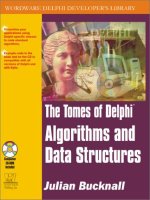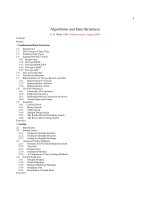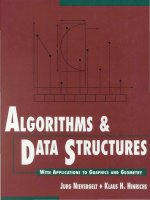Algorithms and Data Structures in C part 5 pps
Bạn đang xem bản rút gọn của tài liệu. Xem và tải ngay bản đầy đủ của tài liệu tại đây (173.48 KB, 5 trang )
Figure 1.2 Memory Implementation for Variable t
Figure 1.3 Mapping of each Union Entry
The organization of each union entry is shown in Figure 1.3. For the union declaration t there are
only eight bytes stored in memory. These eight bytes can be interpreted as eight individual
characters or two longs or two doubles, etc. For instance by looking at Table 1.8 one sees the
value of ch[0] which is 0×41 which is the letter A. Similarly, the value of ch[1] is 0×42 which is
the letter B. When interpreted as an integer the value of i[0] is 0×41424344 which is in 2’s
complement format. Converting to decimal one has i[0] with the value of
If one were to interpret 0×41424344 as an IEEE 32-bit floating point number its value would be
12.1414. If one were to interpret 0×45464748 as an IEEE 32-bit floating point number its value
would be 3172.46.
Code List 1.15 Data Representations
Code List 1.16 Output of Program in Code List 1.15
There are only one’s and zero’s stored in memory and collections of bits can be interpreted to be
characters or integers or floating point numbers. To determine which kind of operations to
perform the compiler must be able to determine the type of each operation.
1.5 Problems
(1.1) Represent the following decimal numbers when possible in the format specified.
125, -1000, 267, 45, 0, 2500. Generate all answers in HEX!
a) 8-bit 2’s complement—2 hex digits
b) 16-bit 2’s complement—4 hex digits
c) 32-bit 2’s complement—8 hex digits
d) 64-bit 2’s complement—16 hex digits
(1.2) Convert the 12-bit 2’s complement numbers that follows to 32-bit 2’s complement
numbers. Present your answer with 8 hex digits.
a) 0xFA4
b) 0x802
c) 0x400
d) 0x0FF
(1.3) Represent decimal 0.35 in IEEE 32-bit format and IEEE 64-bit format.
(1.4) Represent the decimal fraction 4/7 in binary.
(1.5) Represent the decimal fraction 0.3 in octal.
(1.6) Represent the decimal fraction 0.85 in hex.
(1.7) Calculate the floating point number represented by the IEEE 32-bit representation
F8080000.
(1.8) Calculate the floating point number represented by the IEEE 64-bit representation
F808000000000000.
(1.9) Write down the ASCII representation for the string “Hello, how are you?”. Strings
in C++ are terminated with a 00 in hex (a null character). Terminate your string with the
null character. Do not represent the quotes in your string. The quotes in C++ are used to
indicate the enclosure is a string.
(1.10) Write a C++ program that outputs “Hello World”.
(1.11) In Code List 1.8 the twos complement of the largest representable negative
integer, -32768, is the same number. Explain this result. Is the theory developed
incorrect?
(1.12) In Section 1.1.4 the issue of conversion is assessed for signed-magnitude,
unsigned, and 2’s complement numbers. Is there a simple algorithm to convert an IEEE
32-bit floating point number to IEEE 64-bit floating point number?
Previous
Table of Contents Next
Copyright © CRC Press LLC
Algorithms and Data Structures in C++
by Alan Parker
CRC Press, CRC Press LLC
ISBN: 0849371716 Pub Date: 08/01/93
Previous
TableofContents Next
Chapter 2
Algorithms
This chapter presents the fundamental concepts for the analysis of algorithms.
2.1 Order
N denotes the set of natural numbers, {1, 2, 3, 4, 5, . . .}.
Definition 2.1
A sequence, x, over the real numbers is a function from the natural numbers into the real
numbers:
x
1
is used to denote the first element of the sequence, x(1) In general,
and will be written as
Unless otherwise noted, when x is a sequence and f is a function of one variable, f(x), is the
sequence obtained by applying the function f to each of the elements of x. If
then
For example,
Definition 2.2
If x and y are sequences, then x is of order at most y, written x א O (y), if there exists a positive
integer N and a positive number k such that
Definition 2.3
If x and y are sequences then x is of order exactly y, written, x א Θ (y), if x א Θ (y) and y אO (x).
Definition 2.4
If x and y are sequences then x is of order at least y, written, x א Ω (y), if y א O (x).
Definition 2.5
The time complexity of an algorithm is the sequence
where t
k
is the number of time steps required for solution of a problem of size k.
Example 2.1 Time Complexity
The calculation of the time complexity for addition is illustrated in Example 2.1. A comparison
of the order of several classical functions is shown in Table 2.1. The time required for a variety
of operations on a 100 Megaflop machine is illustrated in Table 2.2. As can be seen from Table
2.1 if a problem is truly of exponential order then it is unlikely that a solution will ever be
rendered for the case of n=100. It is this fact that has led to the use of heuristics in order to find a
“good solution” or in some cases “a solution” for problems thought to be of exponential order.
An example of Order is shown in Example 2.2. through Example 2.4.
Table2.1
Order
Compariso
nFunction
n=1 n=10 n=100 n=1000 n=10000
log(n) 0 3.32 6.64 9.97 13.3
nlog(n) 0 33.2 664 9.97×10
3
1.33×10
5
n
2
1 100 10000 1×10
6
1×10
8
n
5
1 1×10
5
1×10
10
1×10
15
1×10
20
e
n
2.7
2
2.2×10
4
2.69×10
4
3
1.97×10
43
4
8.81×10
434
2
n!
1
3.63×10
6
9.33×10
15
7
4.02×10
256
7
2.85×10
3565
9









